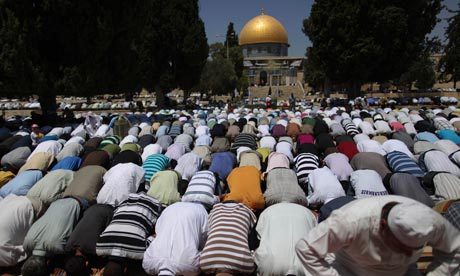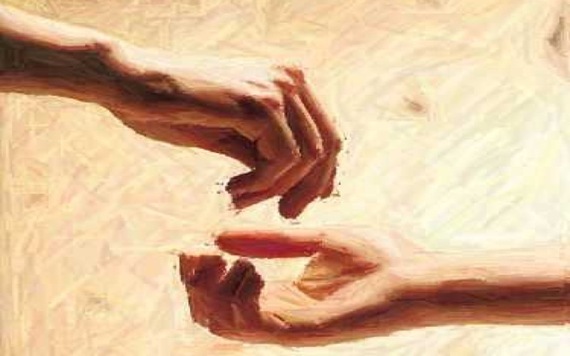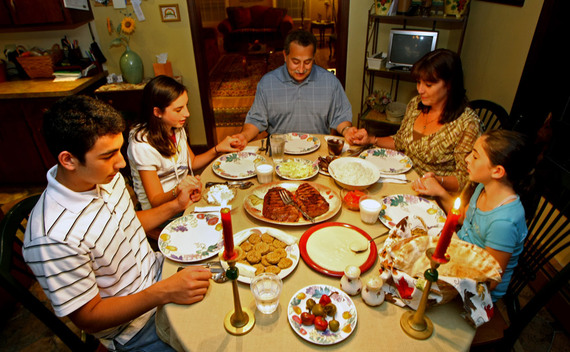Food makes me smile. Whether it be a toasty chocolate croissant, a steaming cup of coffee or a bowl of fruit salad, I almost never turn down an opportunity to excite my taste buds. In certain moments, I know exactly what I want to eat and how I want to eat it. When it's rainy and gray outside, I prefer a cardamom tea with a drip of milk, coupled with a glazed cherry tart. When it's hot and steamy outside, there's nothing better than a chocolate Italian Ice, or a chunk of fresh watermelon.
So, when I immersed myself in the month of fasting,I felt my stomach drop. (Literally). Food was an essential part to my livelihood, to my Instagram posts and bragging rights. I cooked and baked elaborate meals and toted them as a God-given right. At first, the prospect of not eating or drinking from sunrise to sunset scared me. What would I do without my coffee in the morning, or my tea at night? As a young girl, I didn't know I had the power to divide my impulse and my needs. Now, as an expert faster, I celebrate Ramadan 2015 without water or food, in these sometimes unbearably humid days. My secret? Perspective.
So, what is Ramadan? Most people don't know the holiday besides the absence of water and drink. When trying to explain the rituals to others, they widen their eyes and shake their head. "Gosh" they say, "that must be terrible. I'm sorry."
Well, Happy Holidays to you too.
The truth is, Ramadan is so much more than having an empty stomach. The holiday is one of the five pillars of Islam, celebrated to test an individuals self will and power. Although it is highly regarded as a way to improve one's Self, the Quran acknowledges that not everyone can fast "(Fasting) for a fixed number of days, but if any of you is ill or on a journey, the same number (should be made up) from other days. And as for those who can fast with difficulty, (i.e. an old man, etc.), they have (a choice either to fast or) to feed a poor person (for every day). But whoever does good of his own accord, it is better for him. And that you fast, it is better for you if only you know." (2:183-84)". Followers are encouraged to read the Quran every day and pray during the allotted times.
Besides restraining from eating and drinking, Ramadan urges followers to be generous, to offer food and goods to those who cannot afford it themselves. When a panging of hunger rumbles over your body, you can't help but think of those around the world who have no drink or food for days and nights. There are those who are not lucky enough to "break their fast" during sunset, because there is no relief for them. Many followers of Islam donate money to nearby Mosques or poor areas around the world to offer some help.
Ramadan is a time to embrace those who are also fasting, but also be respectful to those who aren't. The holiday highlights the importance of resisting backbiting and gossip. One should never steal during Ramadan, or listen to those who insist on talking badly about others. Ramadan, therefore, is not only about restraining your stomach from gobbling up all the tasty food in your fridge. It's about having total control, mentally, over your habits (especially bad ones).
In order to remain energized during the fasting, Muslims eat Suhoor, a meal that takes place usually around sunrise. This meal is typically smaller than Iftar (the breaking of the fast). It is not encouraged to stay up all night waiting for Suhoor, because that will drain you of energy the next day. Instead, after having Iftar, those who celebrate usually go out for a walk and then come home for a rest until Suhoor. The eating and sleeping schedule is, at first, difficult to adapt to. But once the body is controlled by the mind, it can do anything.
I remember one morning, I was on the train and had woken up at around 6am. I had only had a three hours rest between Suhoor and although I had slept between the breaking of the fast and Suhoor, I was exhausted. My eyes were slipping closed, the train was wonderfully air conditioned, whereas the sun outside didn't seem likely to give up. Then, an old woman with a cane and a heavy bag stepped onto the train. I stared around, waiting for someone to give up their seat. I was exhausted. I was hungry. And, I have to admit, a little bit irritable. But then I remembered the purpose of Ramadan, of being generous and kind to others, of acknowledging your weaknesses and improving your spirit. So I stood up, tapped the woman and she gratefully nodded my way. I stood straight as the train filled up, pressing me against sweaty bodies and coffee cups. But it was okay. I felt good.
Ramadan is about more than just not eating. It is about more than being hungry all day or complaining about thirst. It's about caring for others, genuinely loving your neighbors and realizing that you control yourself. Your actions are made by you. Ramadan forces you to be accountable for the choices you make in life, while also showing you that you have the power to effect others.
And that, I truly believe, is beautiful.
-----
Happy Ramadan to Muslim readers! May you and your family enjoy a lifetime of prosperity and happiness.


